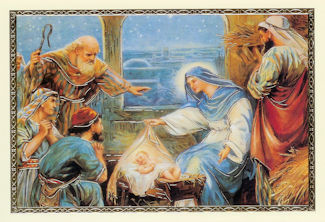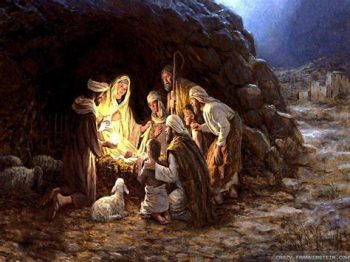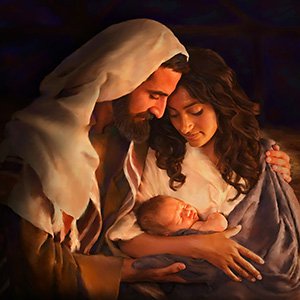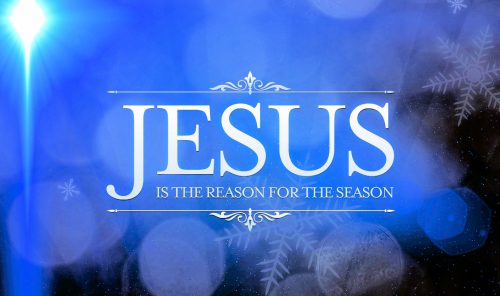What is your first thought, when I say Christmas? Go ahead, be honest with yourself, I’ll never know. Is it Christmas trees, shiny decorations, or children unwrapping their presents? Or, is it the holly-jolly music or the holiday pastries and candies? Is it Christmas parties or Santa Claus? Most everyone thinks about those things and very few resent anything about them.
Recently, while talking with my wife about the Christmas season, I asked her if there was anything in particular she resented about this holiday. Her quick answer surprised me for she said, “Yes, I resent the invention of glitter.” A curious response I thought, and then we began making jokes about all the glitter used around Christmas time. Later, while thinking about that discussion, I wrote a little poem, although a somewhat exaggerated one. I could relate to her thoughts, because I used to feel the same way when, many years ago, I was very much into Christmas celebrations. So, here is my poem.
Glitter
 Glitter, glitter, it’s everywhere;
Glitter, glitter, it’s everywhere;
Upon my clothes and in my hair,
Flying colors ever so bright,
Reflect tiny sparkles of light.
At Christmas time it is the worse,
I often feel it’s like a curse.
The glitter settles everywhere,
It’s hard to see with all that glare.
It is sent to me, in the mail;
Bringing it inside leaves a trail,
From every pretty Christmas card,
Wow. It’s such a mess . . . O’ My Lord!
It is on the gifts brought to me;
It’s even on the Christmas tree,
Parcels that are delivered, too;
Yes, it’s an awful mess, that’s true.
How can something that’s so pretty,
Raise bad feelings — so much pity.
Glitter, glitter, it’s everywhere;
It takes a month to clear the air.
Copyright © 2018, Ray Hermann
That’s enough joking around, now let’s get back to the reason for this essay. While most everyone thinks about those things mentioned in the first paragraph (Santa Claus, Christmas presents, etc.), how many think about the story of Jesus’ birth, or where and how it all happened, or even the reasons for it. Do you celebrate the religious Christmas or the commercialized Christmas? Maybe you celebrate a little of both, or maybe not at all.
My wife and I now think of Christmas only as a religious occasion, without the worldly cultural and commercial attachments. We realize that Jesus was not born on Christmas day, but since everyone celebrates that time as his birthday, it is nice that Christ is, at least, getting a bit of extra attention at that time of year – to some extent, anyway. The problem, of course, is that even at Christmas, less and less people even mention Jesus anymore.
We have not celebrated the holiday with gift exchanges, Santa Claus, decorations, or most of the normal traditions, for many years, since we realized all the commercial activities drove us away from Christ, instead of bringing us closer to him. As my wife often says, “Why is everyone giving gifts and celebrating other people, if it is really Jesus’ birthday?” After all, as it is often said, Jesus is the reason for the season, so we give our attention, praise, and thanks to him.
 Now we still have, or we attend, Christmas dinners and we sometimes get together with family members or exchange Christian greetings, but we don’t get into all the commercialized and non-Christian aspects related to the modern Christmas holiday season. We don’t mind that others do so; it is just not for us. Most of our family and friends do celebrate with great fanfare and we always ask about their celebrations and events, because we are interested and care about them.
Now we still have, or we attend, Christmas dinners and we sometimes get together with family members or exchange Christian greetings, but we don’t get into all the commercialized and non-Christian aspects related to the modern Christmas holiday season. We don’t mind that others do so; it is just not for us. Most of our family and friends do celebrate with great fanfare and we always ask about their celebrations and events, because we are interested and care about them.
Our attitude, I guess, is one similar to that of an acquaintance. She said she doesn’t believe in the Christmas season and her home displays nothing relating to the holiday, but since her friends participate, she celebrates with them when she is with them, out of friendship and respect, not because of belief. She does the same on Jewish holidays and other celebrations, too. When asked, she explains her own beliefs, but says she likes to share in her friends’ happiness. That seemed like a mature approach, to me.
Can you answer these questions?
There are plenty of things about Christmas that even many serious Christians can’t answer, but I don’t want to make this holiday article too long, so I’ll list only a few. These are fun facts that can easily be brought up at holiday events or around the family dinner table; can you answer them correctly?
What does Christmas mean?
A Catholic encyclopedia states that Christmas means the Mass of Christ1 and was not among the earliest festivals of the Church. The first evidence of the feast, was from Egypt about 200 A.D. and the first use of the term “Christmas” was after 1000 A.D.
Some Christian sects do not celebrate this holiday, and even in colonial America it was not celebrated by the Pilgrims. Their reasons included “. . . the fact that it did not originate as a Christian holiday. The upper classes in ancient Rome celebrated Dec. 25 as the birthday of the sun god Mithra. The date fell right in the middle of Saturnalia, a month long holiday dedicated to food, drink, and revelry, and Pope Julius I is said to have chosen that day to celebrate Christ’s birth as a way of co-opting the pagan rituals. Beyond that, the Puritans considered it historically inaccurate to place the Messiah’s arrival on Dec. 25. They thought Jesus had been born sometime in September.”2
So, when was Jesus born?
The date is not mentioned in the Bible, but most modern scholars believe Jesus was born in late September or early October. There has always been disagreement about his birth date. Clement of Alexandria wrote that some said it took place in the Egyptian month of Pachon (on May20), others said it was in the month of Pharmuthi (on April 20 or 21). Suggested in other writings are April 18 or 19, March 25, January 2, November 17 and November 20. So, as you can see, these supposed dates are widely scattered.3
Was Jesus born in a stable?
 Common belief is that Jesus was born in a stable in the city of Bethlehem, because there was no room at the Inn, and then was laid in a manger (feed trough).4 “Churches, like the Greek Orthodox Archdiocese of America, state that Jesus was born in a cave, as they were used by shepherds of the time to shelter animals from hostile weather.”5 And there are historical records to suggest that, during the first-century, animals were kept in caves and that feed troughs were generally made of stone, not wood.6
Common belief is that Jesus was born in a stable in the city of Bethlehem, because there was no room at the Inn, and then was laid in a manger (feed trough).4 “Churches, like the Greek Orthodox Archdiocese of America, state that Jesus was born in a cave, as they were used by shepherds of the time to shelter animals from hostile weather.”5 And there are historical records to suggest that, during the first-century, animals were kept in caves and that feed troughs were generally made of stone, not wood.6
A very fascinating theory is that Jesus was born in a house, not a stable or a cave. A U.K. theologian, Ian Paul, says that the ‘birth of Jesus’ story is based upon a misreading of the New Testament. “Dr. Paul argues that the Greek word, kataluma, usually translated as ‘Inn’ was in fact used for a reception room in a private house – the same term is used to describe the ‘upper room’ where Jesus and his disciples ate the last supper. An entirely different word, pandocheion, is used to describe an ‘Inn’ or any other place where strangers are welcomed.”7
Some scholars have speculated that Joseph and Mary may have sought to stay with relatives in Bethlehem, so Dr. Paul argues that Joseph and Mary would not have been staying at a public Inn. “The only reason for them to travel to Bethlehem for the census was because he had family there and if he did, the customs of first-century Palestine required him to stay with relatives and not with strangers. In that context, the kataluma where he stayed would not have been an Inn, but a guest room [or upper room] in the house of the family where Joseph and Mary were staying. That could very well have been full with other relatives who had arrived before them.
“The actual design of Palestinian homes (even to the present day) makes sense of the whole story.” Paul continues, “Most families would live in a single-room house, with a lower compartment for animals to be brought in at night . . .” That would mean Jesus was not born in a stable, but upon the floor where the animals were kept in the house.8
How many wise men (or Kings or Magi) visited Jesus when he was born?
 The short answer is – none! As for visiting when Jesus was born, no such wise men did so. It was much later when they arrived and the Bible completely omits how many of them made the trip, so we really don’t know. The Bible does not specify the interval between the birth and the visit, but it took much time to prepare for the trip and then travel a long distance, so by the time the wise men located where Jesus was living, it is figured that he must have been between six months and two years of age. They gave him three gifts: gold, frankincense, and myrrh. Because there were three different gifts, it is only speculated that each came from a different wise man. We really don’t know how many they were, only that it was at least two.9
The short answer is – none! As for visiting when Jesus was born, no such wise men did so. It was much later when they arrived and the Bible completely omits how many of them made the trip, so we really don’t know. The Bible does not specify the interval between the birth and the visit, but it took much time to prepare for the trip and then travel a long distance, so by the time the wise men located where Jesus was living, it is figured that he must have been between six months and two years of age. They gave him three gifts: gold, frankincense, and myrrh. Because there were three different gifts, it is only speculated that each came from a different wise man. We really don’t know how many they were, only that it was at least two.9
Read the full story
You can read the full story of Jesus’ birth in two books of the Bible at Matthew 1:18–2:21 and Luke 2:1–21. Considering the importance of the story and how the events have been extended into lengthy narratives, the story in scripture is rather short. Between the two books, there are only 45 verses describing the events. Plays, movies, songs, and readings about these verses are performed every year during the Christmas season. My current favorite song about the nativity of Jesus is “Go Tell It on the Mountain.” A video of a very cool progressive jazz rendition of this Gospel song is listed at the end of this article. Selected lyrics are below; see References & Notes for the music video.10
 Go tell it on the mountain
Go tell it on the mountain
Over the hills and everywhere
Go tell it on the mountain
Our Jesus Christ is born
He made me a watchman
Upon a city wall
And if I am a Christian
I am the least of all
We have answered the questions posed and more, but not the reasons for Jesus’ birth. That would be a bit too long, in this article, to tell, but I did explain it in a past essay titled “What do you mean, Christ died for our sins?”11 That article explains the full story of the reason for Jesus’ birth, as well as the reason for his death, and how it all will benefit your life (and everyone’s life) in the future. As to whether one should celebrate Christmas with all the commercial and secular accompaniments — well, that is your choice. If in doubt, ask for guidance in prayer. God gave you the free will to celebrate it however you wish, or not to celebrate it at all.
![]()
Copyright © 2018, Dr. Ray Hermann
OutlawBibleStudent.org
→ Leave comments at the end, after References & Notes.
OBS respects your privacy and is also compliant with the European Union GDPR regulation. Click here to read.
References & Notes
- “Christmas,” Catholic Encyclopedia, (at Catholic Online, retrieved 12 October 2018), https://www.catholic.org/encyclopedia/view.php?id=2933
- “When Americans banned Christmas,” (The Week, 20 December 2011), https://theweek.com/articles/479313/when-americans-banned-christmas
- “Christmas,” (Wikipedia, Wikimedia Foundation, Inc., 28 October 2018), https://en.wikipedia.org/wiki/Christmas
- manger : a trough or open box in a stable designed to hold feed or fodder for livestock
Merriam-Webster’s Collegiate Dictionary, 11th ed., (Springfield, MA: Merriam-Wester, Inc., 2003). - Gryboski, Michael, “Christmas History: Was Jesus Born in a Cave?” (The Christian Post, 25 December 2013), https://www.christianpost.com/news/christmas-history-was-jesus-born-in-a-cave-111405/
- Abbott, Shari, “Was Jesus Born in a Stable, a Cave or a House?” (Got Questions, 8 December 2014), https://reasonsforhopejesus.com/was-jesus-born-in-a-stable-cave-house/
- Brown, Andrew, “Jesus was not born in a stable, says theologian,” (The Guardian, 23 December 2014), https://www.theguardian.com/world/2014/dec/23/jesus-christ-not-born-in-stable-theologian-new-testament
- Ibid.
- Hovind, Eric, “The Wise Men and the Star.” (Creation Today, 28 November 2011), https://creationtoday.org/the-wise-men-and-the-star/
- “Go Tell It On The Mountain,” performed by artist David Phelps, (© 2018, David Phelps Concerts, Inc.), licensed to YouTube by UMG on behalf of Gaither Music Group), – VIDEO, https://youtu.be/zGwEXxCVa_k
- Hermann, Ray, “What do you mean, Christ died for our sins?” (The Outlaw Bible Student, OBS, 31 December 2017), https://outlawbiblestudent.org/what-do-you-mean-christ-died-for-our-sins/


3 thoughts on “A few questions about Christmas – and what is it with all that glitter?”